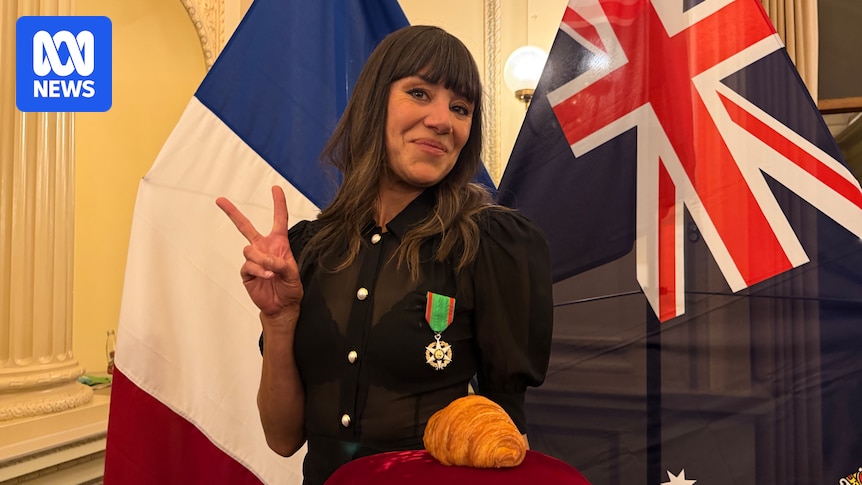
As Kate Reid stepped through the doors of one of Paris’s most renowned bakeries, she was filled with a mix of excitement, hope, and a renewed sense of purpose. It was 2010, and the young woman from Melbourne was grappling with anorexia, a battle that had nearly claimed her life. “I don’t know if many people could say they’ve had an overwhelming experience in a bakery, but that’s exactly what it was,” she recalls.
Kate Reid’s story is far from ordinary. At 23, she had already secured a coveted position as an aerospace engineer with an international Formula One (F1) team. However, the reality of working in F1 did not match her dreams, leading her into a spiral of anorexia as she sought control over her life through her body.
The Intersection of Pastry and Healing
Kate’s journey took a transformative turn when she discovered her passion for pastry, particularly the croissant. Her father, Bob Reid, notes, “When you suffer from anorexia and you fall in love with baking, it’s almost an oxymoron. I mean, the two don’t go together.” Yet, for Kate, the technical and artistic demands of pastry-making became her salvation.
A pivotal work placement at the Parisian bakery Du Pain et des Idées allowed Kate to immerse herself in the art of croissant production. Returning to Melbourne, she embarked on a meticulous process of perfecting the croissant, which eventually led to the founding of Lune, a chain of croissanteries renowned for what the New York Times described as some of the world’s best croissants.
“The croissant to me is the Formula One of the pastry world,” Kate explains. “It’s incredibly technical, and I guess it’s where I found the intersection of baking, art, science, and engineering. It healed me.”
Early Struggles and the Pursuit of Control
Kate’s need for control began in her early years. Diagnosed with chronic asthma at 18 months, she was hospitalized 13 times before turning four. “The asthma was the earliest example of a huge element of my life being out of control,” she reflects. Her parents, Bob and June, became her pillars of support, with Bob often rescuing her during nighttime asthma attacks.
Growing up, Kate idolized her father, an engineer with a passion for car racing. This shared interest in cars led to her obsession with Formula One. At 13, attending the Australian Grand Prix with her father ignited her ambition to become the first female technical director of an F1 team. She meticulously planned her path, achieving her goals two years ahead of schedule.
The Dream Job That Wasn’t
In 2006, Kate moved to England to work as a junior aerodynamicist at Williams F1. However, the reality of the job was far from her expectations. The role was isolating, with little collaboration or inspiration. The lack of female colleagues and basic facilities added to her sense of alienation, leading to panic attacks and a decline in her mental health.
To regain a sense of control, Kate became fixated on her fitness and diet, a path that spiraled into anorexia. Her parents were alarmed by her deterioration during a visit home, and Kate eventually returned to Melbourne for treatment after reaching a breaking point.
“If I wasn’t this groundbreaking female engineer working in Formula 1, then maybe it didn’t matter if I didn’t exist anymore,” she says, reflecting on her mindset at the time.
Finding Redemption in Baking
Back in Melbourne, Kate’s love for baking, nurtured during her childhood, became her new focus. Despite the challenges of her eating disorder, she immersed herself in the world of pastry, finding solace in the precision and control it required.
Her turning point came when she discovered a book about Parisian patisseries, captivated by an image of pain au chocolat from Du Pain et des Idées. This led her to Paris, where a work placement rekindled her passion and marked the beginning of her recovery.
Returning to Melbourne, Kate dedicated herself to perfecting the croissant, applying her engineering skills to the process. Her family supported her, and she leased a small workspace to test her recipes, eventually creating the perfect croissant.
“All the things that are required in engineering are also applicable to pastry — precision and control,” Bob Reid observes.
Lune Croissanterie: A New Chapter
Lune Croissanterie opened as a wholesale bakery in 2012, with Kate’s brother Cameron joining to help expand it into a retail business. The bakery quickly gained a following, with customers lining up in the early morning hours.
In 2016, the New York Times recognized Lune’s croissants as some of the world’s best, propelling the business to new heights. Today, Lune operates seven stores across three states, employing 300 staff members. Kate was recently awarded France’s Order of Agricultural Merit for “redefining” the croissant, and her memoir, Destination Moon, is set to be released soon.
For Kate, relinquishing control has been crucial for both her business and personal recovery. “We think we can have control of everything, but we can’t,” she acknowledges. Managing her eating disorder remains a lifelong struggle, but she is committed to avoiding past behaviors and finding comfort in the present.
“Maybe success is having the self-awareness to realize that you’re actually living a great moment right now, and to appreciate it,” she concludes, hoping her story inspires others facing similar battles.







